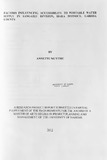| dc.description.abstract | This study is about access to safe drinking water supply in Sangailu division, Ijara District. Despite efforts made by the Government, Non Governmental Organizations, Donors and the local communities to provide portable, safe, reliable and adequate water for Sangailu Division, acute water shortages and its associated socio-cultural, political and economic problems are still experienced in most parts of the division. Furthermore, majority of the already implemented rural water supply projects (if any) have either been abandoned (non-functional) or only function intermittently and therefore, have failed to meet the expectations of the stakeholders. Thus, the purpose of this study was to establish factors influencing accessibility to portable water supply in Sangailu division, Ijara district, Garissa County. The study sort to determine: whether socio-cultural, political and economic factors influence accessibility to portable water supply in Sangailu division. The study has given detailed background information on water crisis at the global, national and local level while highlighting the relevance of the study to the community, Government and NGOs.
Literature review has captured the diverse views of the various scholars on the topic under study. This study is a descriptive survey design which employs questionnaire interview schedules and observation as the data collection instruments. The data was analyzed using descriptive and qualitative techniques. The study concludes that: inadequate management of existing water sources, cultural beliefs, population growth, inadequate funding for water supply projects and low household income influences accessibility to portable water supply in Sangailu division. The study therefore recommends that: water, sanitation and hygiene education programmes should be put in place to impact knowledge and skills to the community on water resource management. Government and donors from the Non Governmental Organizations should allocate adequate funds to portable water supply projects; piped water supply should be developed; poverty alleviation programmes to go hand in hand with portable water supply development; implementation of portable water supply to be coordinated; and the design and planning of portable water supply projects should integrate cultural concerns. Nonetheless, these factors are not exhaustive. The study therefore suggests that the following areas need further investigation as they could have a profound influence on portable water supply. These include: impact of drought on the supply of portable water; the influence of policy and decision makers on resource allocation; the impact of environmental pollution on open water sources in the arid and semi arid land. | en_US |

